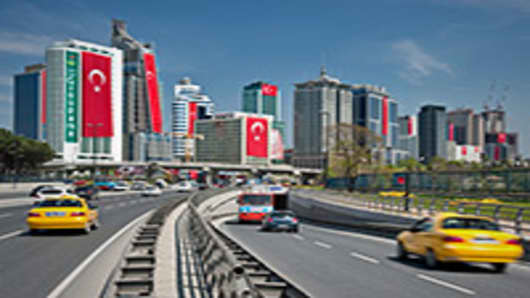Turkey may be a net energy importer, but its geostrategic location in serving as an "energy corridor" means a further escalation with neighbor Syria could reverberate to market prices and weigh on energy investments, analysts have told CNBC .
On Wednesday, as the crisis in Syria claimed more lives, United Nations envoy Lakhtar Brahimi warned again that the "Syria conflict could set the region ablaze". This as tensions persist on the border, and the Turkish government has reinforced its military presence in the area. Earlier in the week, Turkey and Syria introduced tit-for-tat bans on civilian flights from their respective territories.
Turkey is already home to a global choke point, the Bosphorus Strait, but with violence on its eastern border, another set of elements could come into play for traders. In focus is the Turkish port city of Ceyhan, less than 50 miles away from the turmoil of the Syrian frontier and the meeting point for several transnational pipelines. Although no operational one actually crosses through Syria, their proximity to the border and key accompanying infrastructure make them possible targets in an all-out war.
"The terminus exports around one million barrels per day, and an attack on it could add some $5 per barrel to the price in the short-term, " Emad Mostaque, Strategist at Religare Noah, told CNBC.
A strike on Ceyhan's port facilities is unlikely, experts say, as it would likely trigger a response from the 28-member alliance of the North Atlantic Treaty Organization (NATO).
"We have all necessary plans in place to protect and defend Turkey if necessary, " NATO's Secretary-General Anders Fogh Rasmussen said last week.
The pipelines that connect to Ceyhan include the Baku-Tbilisi-Ceyhan (BTC) and Ceyhan-Kirkuk line. And both have been put to the test in the past with limited reaction from global benchmarks. The BTC, operated by a BP-led consortium, is a vital 1.2-million-barrel-per-day (bpd) connection that transports crude from offshore fields in the Caspian Sea to the Mediterranean.
The Ceyhan-Kirkuk line, with a capacity of 1.65 million bpd according to the the Energy Information Administration (EIA), has also witnessed several acts of sabotage over the years. In August, a blast and subsequent fire hit the pipeline on the Turkish side, which carries an estimated one quarter of Iraqi oil exports. The Kurdistan Workers' Party (PKK), a group fighting for a Kurdish state in the region, has often been blamed for targeting energy infrastructure in the country.
"The chances of a hot fight, which would have a more crucial effect on energy prices and security, should be continuously watched out for, " Batu Aksoy, CEO of Turcas Petrol AS, a Turkish energy holding company, told CNBC.
For Turkey, higher oil prices add substantial pressure on the current account deficit , often described as the weakest link in the G20 economy. Authorities are striving for energy independence, and many industry players believe that although the troubles in Syria will not disrupt those plans, it will make funding new national or transnational projects more challenging.
"We have utmost confidence in the future of the Turkish economy . We continue to invest in energy projects. But at the same time we are dealing with more challenging financing conditions stemming not only from economic reasons but also political uncertainties, " Aksoy admitted.
It remains unclear as to how much of a geopolitical risk premium is reflected in current prices. The International Energy Agency reduced its global demand forecast on October 12 in light of the possible impact of slower economic growth on fuel consumption. Mostaque for one is convinced much more is already accounted for.
"The term structure for Brent crude is already pricing in significant geopolitical risk, which is overdone given an attack on Iran is highly unlikely until February given US elections and apparent success of sanctions".
Yousef Gamal El-Din is CNBC's Middle East Correspondent and contributes to the channel's flagship shows, as well as analysis for CNBC.com.
Stay in touch with him on Twitter at http://www.twitter.com/youseftv @youseftv


